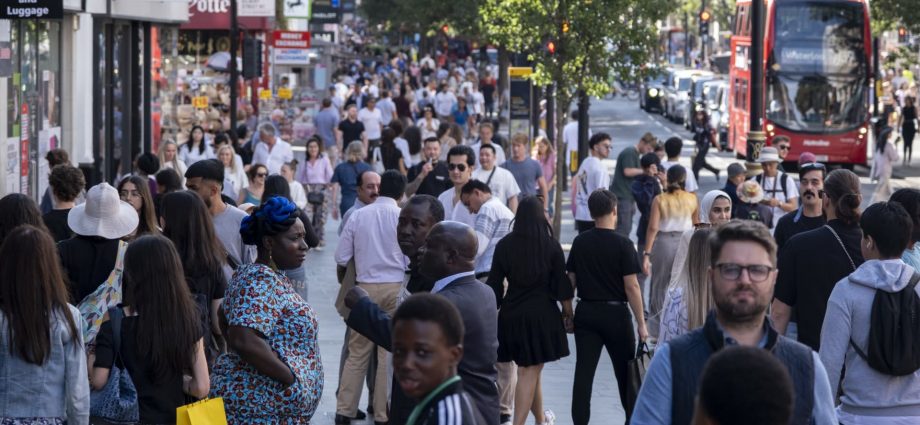Crowds of shoppers and visitors out on Oxford Street on 28th August 2024 in London, United Kingdom.
Mike Kemp | In Pictures | Getty Images
The U.K.’s inflation rate fell slightly to 2.8% in February, coming in just below analyst expectations, according to data released by the Office for National Statistics (ONS) on Wednesday.
Economists polled by Reuters had anticipated the consumer price index would hit 2.9% in the twelve months to February.
The rate of inflation had risen sharply to 3% in January, after falling to a lower-than-expected 2.5% in December.
Core inflation, which excludes more volatile energy, food, alcohol and tobacco prices, rose by 3.5% in February, down from 3.7% in January.
“The slowing in the rate into February 2025 reflected downward contributions from four divisions and upward contributions from five divisions. The largest downward contributions came from clothing and footwear, housing and household services, and recreation and culture,” the agency said.
Sterling fell 0.1% against the dollar, hitting 1.2925 following the data release.
The latest data will be food for thought for the Bank of England, which left interest rates at 4.5% at its monetary policy meeting last week, as the U.K. economy grapples with uncertainty around global trade policies, possible tariffs, a forecasted temporary rise in inflation and looming stagnation at home.
In a statement at the time, the central bank said “global trade policy uncertainty has intensified, and the United States has made a range of tariff announcements, to which some governments have responded.”
“Other geopolitical uncertainties have also increased and indicators of financial market volatility have risen globally,” it added.
The BOE had already warned in February that it expected inflation to temporarily rise to 3.7% in the third quarter of this year, as energy costs are set to accelerate. It also halved its 2025 growth forecast for the U.K. to 0.75%.
Slowdown a ‘red herring’
The inflation data will be closely watched by the British government as Finance Minister Rachel Reeves prepares to later on Wednesday update lawmakers on her spending and taxation plans, as well as the nation’s economic outlook.
Reeves is expected to announce billions of pounds worth of spending cuts as a way to close a budget shortfall caused by a rise in borrowing costs since her first fiscal plan released last fall.
The finance minister has already vowed to stick to her self-imposed “fiscal rules” to ensure that day-to-day spending is met by tax revenues and that public debt is falling as a share of economic output by 2029-30.
Reeves’ Spring Statement is due to be presented in Parliament around 12.30 p.m. London time, and will be delivered alongside the latest economic forecasts from the Office for Budget Responsibility (OBR), the country’s independent public finances watchdog.
The OBR is reportedly expected to downgrade the U.K.’s growth forecasts for 2025 and halve its previous 2% estimate, with lower output putting upward pressure on the government’s borrowing requirements and forcing Reeves to cut public spending by around £10 billion ($12.96 billion).
Following the inflation data release, Chief Secretary to the Treasury Darren Jones said that the finance ministry’s priority was “kickstarting growth to raise living standards for working people” and “delivering economic stability to secure people’s finances” in what the government describes as a “changing world.”
Paul Dales, chief U.K. economist at Capital Economics, nevertheless warned that the latest inflation print would not help the BOE or chancellor Reeves much.
“The dip in CPI inflation from 3.0% in January to 2.8% in February is a bit of a red herring as inflation will probably be back above 3% in April and around 3.5% by September. That and the risk of spillovers into wages will probably mean the Bank of England will press pause on interest rate cuts at some point in the coming months,” Dales said in emailed comments Wednesday.
“If that were to prompt a further rise in market rate expectations, today may not be the only time this year the Chancellor has to tighten fiscal policy to compensate for higher borrowing costs,” he added.
Dales said the consumer price index may drop back to around 2.5% in March but that would be a brief reprieve, with rising energy costs likely to drive inflation higher, and to a potential 3.5% in September.
“That would be a little lower than the Bank’s forecast of 3.7% and we suspect the weak economy will weigh on wage growth and inflation further ahead. Inflation may then fall to 2% in 2026 meaning interest rates can be cut from 4.50% now to 3.50%,” he said.


